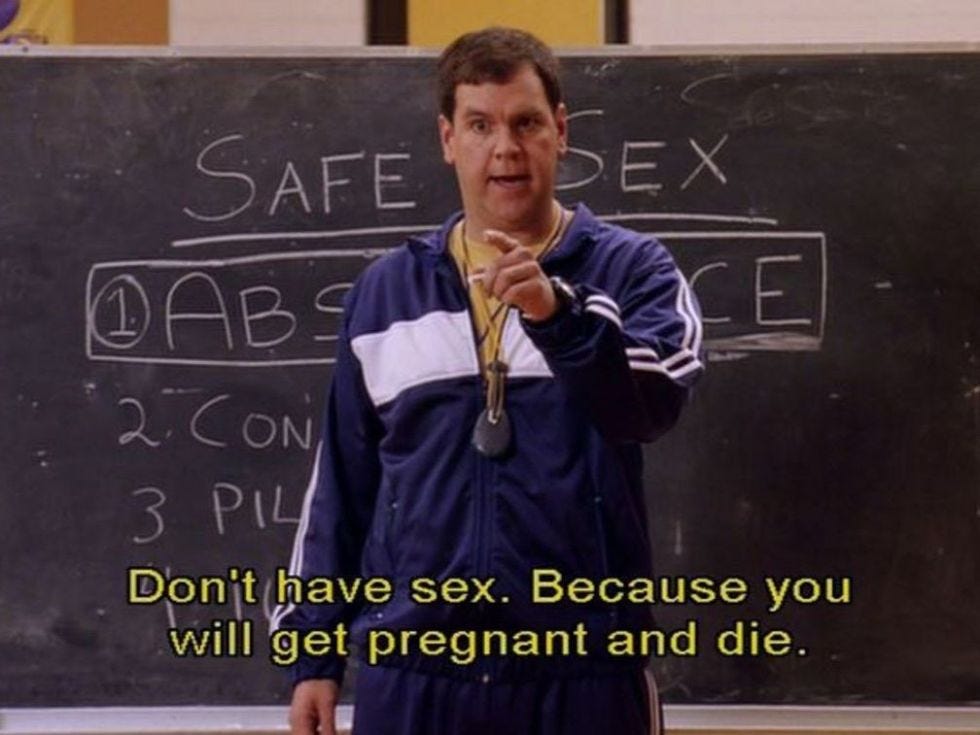Let’s Talk About Sex (and Why Filipinos Don’t Talk About It)
Tackling purity culture, shame, and destigmatizing sex ed with Trish Bautista, co-founder of Unprude, a sex therapy app in the Philippines.
Think back on your first encounter with sex education. Did a health teacher offer a straightforward, biological explanation? Did your parents give you a euphemism-laden version of “The Talk”? Were you fed a confusing jumble of abstinence and misinformation à la Coach Carr in Mean Girls?
For Trish Bautista, like many Filipinas, it was her Catholic school in Manila preaching one thing: virginity is the greatest gift you can give your partner.
Now, as co-founder of the sex therapy app Unprude, Trish hopes Filipinas can move past this narrow lens and get equipped with shame-free education, guidance, and a deeper understanding of their sexual selves. That’s not easy in a country where 78.8% identify as Roman Catholic, abstinence continues being pushed, divorce is banned, and conversations about contraception, consent, STIs, and reproductive health are swept under the rug. Meanwhile, teen and pre-teen pregnancies in the Philippines rise at an alarming rate.
“Within Filipino culture, we never explicitly say ‘sex.’ We think about it from a fear perspective. It lives rent-free in everybody’s heads, but it’s not something we talk about,” Trish tells Pearl.

Only 1.1 million out of 32 million students in the Philippines have access to sex education, according to estimates from the United Nations Population Fund. Meanwhile, as recently as January 2025, conservative religious groups lobbied against public schools implementing Comprehensive Sexuality Education (CSE), a framework promoted by UNESCO to educate about “sexuality with a positive approach, emphasizing values such as respect, inclusion, non-discrimination, equality, empathy, responsibility, and reciprocity.” That sounds promising enough, but critics–including President Ferdinand Marcos Jr.–accused the international standards of teaching children sexually advanced concepts, like masturbation (a wrongful sensationalization of the curriculum).
So, how do you destigmatize conversations around sex in a country where the mere mention of it is taboo?
You create an app.
“I was going through a breakup while Unprude happened,” Trish says. During this transformative period of her life, she followed sex therapists online and got introduced to Dr. Rica Cruz, the only Filipino to be US board-certified in Clinical Sexology. “I was like, I can’t believe there’s a sex therapist in the Philippines!” she recalls. Trish joined as Co-Founder and Brand & Content Director, and they launched Unprude in 2021. The app encourages users to embrace their sexuality by providing expert guidance via podcast episodes, audio meditations, resources answering questions about love, relationships, sex, contraception, and games to spark intimate conversations. On top of the app and selling products like toys and flavored lubes, Unprude also hosts the Unbecoming Summit, the first-ever sexual wellness summit in the Philippines.

Trish feels passionate about empowering Filipinas with better access to information because, as she explains, sex is never just about the act of sex. Sex, and your understanding of it, is connected to your overall well-being. “It’s such a window to someone’s entire personhood–how you navigate intimacy and relationships. Sex is very revealing of how you grew up, how you were raised, what you carry with you, how you deal with conflict, and what your beliefs are,” she says.
Ahead, we dive deeper into Trish’s own journey, the problem with purity culture in the Philippines, and truths about shame and sexuality every Filipina needs to hear.
Kristina Rodulfo: I'm excited to chat with you because one thing I want to do in this newsletter is explore the topics that we, as Filipinos, don't talk about. Sex is often a taboo topic in Filipino households. I really admire what Unprude is trying to do with destigmatizing conversations around it. What was your first experience with discovering your sexuality?
Trish Bautista: I grew up in Manila and attended an all-girls Catholic school from 6 years old to 18, before moving to the U.S. Growing up, basically everyone around me was into girls. It was the norm. It’s this very specific subculture in Manila you don’t hear about. You almost have to “come out” as straight! Within my peers, we started exploring crushes and sexuality, and it was contained in this almost innocent, really wholesome way. I am bisexual – I feel grateful that I was able to explore that with girls. But, my school was run by nuns. It was not only taboo, but prohibited–you could get expelled.
Kristina: What was your introduction to sex education in school, if any?
Trish: We had an orientation at the start of every year. It was very rule-heavy–almost militaristic–but we would talk about the handbook, and the biggest topics were about sex, but it was never mentioned explicitly. It would be: “The greatest gift you could give your future husband is purity.”
Sex is just what it is. It's a supposedly morally neutral thing, but when your first introduction to the idea of intimacy and sex is fear, then you operate that way all through your adulthood. They would always say in our assemblies the typical narrative of boys only want one thing. Purity is this thing that you have to protect because it can be stolen. You're always the victim. You’re prey.
The underpinnings of it are Filipino culture and the purity culture that comes with that. I see people in the Philippines who got pregnant early…it came from a lack of knowledge about sex. For me, I experienced a lot of slut-shaming because I was experiencing sexuality early. I carry that today, too.
Kristina: I feel like there's such a culture of shame in Filipino culture, and it governs a lot of our interactions. The conflation of this idea of purity and virginity is ingrained in our culture. A lot of it has to do with Catholicism: the idea of saving yourself for marriage, the sanctity of consummating a marriage. It's very religious-based.
Trish: Yes. And, hearing that from 13 years old–when you're just starting to have crushes on people–that innocence is corrupted by this adult, corrupted view of sex. You assign this darkness to sex.
Kristina: What you're saying resonates so much because I feel like so many young Filipino women get sexualized from a young age. They’ll hear comments from adults like, “Oh, dalaga ka na, you’re a woman now,” and you’re only 11 years old. I don't know if you experienced that, but I definitely did.
Trish: In Filipino culture, we're so comfortable commenting on people's bodies. You are so hyper-aware of your physicality as a young girl. People have commented on my body as a young girl. Relatives–they might not necessarily have malice or ill intent– but it [gave me] this hyper-awareness that a kid really shouldn’t have about their body.
“Sex is just what it is. It's a supposedly morally neutral thing, but when your first introduction to the idea of intimacy and sex is fear, then you operate that way all through your adulthood.”
Kristina: In the Unprude app, I watched a video where you are talking about feeling slut-shamed for wearing shorts. What made you feel that way?
Trish: I experienced a lot of that. The consequences don't just manifest in the act of sex or relationships–it's also how you carry yourself as a young woman in this world. When you're younger, you might not be as comfortable revealing yourself because of the culture of shame. But I remember being in my early teens, where you jump into trends, and the trend was a certain length of shorts. I remember there was a birthday party that I was going to, and I finally had the courage to wear these shorts. I'm like, this is going to be so cute. Everyone's wearing them! I go down the stairs and someone in my family would comment on it, basically slut-shaming me.
Kristina: And you’re in the Philippines, where it’s hot!
Trish: Yes, exactly. What am I going to wear? Skinny jeans? Even wearing makeup means “flirty.” But, really, there's undertones of “slut.” You're trying to seduce people. That's what you would hear at freaking 14 years old? Even to this day, I remember: I once went to Seafood City. I didn’t have an issue wearing a crop top that whole day. Then, in Seafood City around other Filipinos, especially older Filipinos, I felt myself starting to tug my shirt down. The shame lives in your body. The culmination of this, and experiences of heartbreak in my early adulthood, is what brought me to work on Unprude. Your sexuality is such an integral part of ourselves–it’s not just the act of sex.
Kristina: I think that’s important. Even just looking at the forums on the Unprude app, people have a safe space to ask questions. It’s not normalized in our culture to talk about these things. You know how, in American movies and TV shows, they have parents giving “The Talk”? There is no “The Talk” in our culture.
Trish: You’re just magically supposed to know.
Kristina: Magically! I remember another cultural difference I experienced in the Philippines is, my family would always tell me I have to wear a t-shirt and shorts to go to the beach.
Trish: You go there, and everyone's wearing board shorts and a t-shirt! Thankfully, my friends are progressive, but again, that is afforded with certain privileges because it is within a certain socioeconomic class. We can go to these beach towns, wear bikinis, and even post them on Instagram, god forbid. Even when I go to Manila, we live in a condo, and there’s a public pool. A lot of why I don’t use it is because I’m like, do I wear a bikini or a t-shirt?
Kristina: All of this policing over how women dress–whether it’s shorts or a bikini–what kind of message do you feel that sends to women?
Trish: That your body is not yours. Your dignity can be taken, so you must protect it, but if you don't, it's also your fault. It’s a catch-22. What that says to young women is that they don't have agency over their bodies. What we're trying to do with Unprude is show you that you can own your whole identity, including your sexuality, on your own terms. I feel like understanding, even just being inquisitive about your sexuality, allows you to get closer to your whole self because it is one of the most human parts of us.
Kristina: When you first introduced Unprude’s app and products–lubes, toys–and started hosting sexual wellness summits, what kind of reactions did you get from Filipino women?
Trish: There are nuances to the reception of a sexual wellness brand. People were generally supportive. A lot of women have a fire within them that is ready for change. At the same time, I will say, people are more receptive to sex when it's contextualized a certain way–like marriage–as opposed to pleasure. Sex is okay in Filipino culture if you're doing it so you can enhance your marriage. A lot of times it’s the “duty” of a woman to make the husband happy. It’s changing, but Filipino women still carry that. When you talk about married sex, reproductive health, STIs, pregnancy, birth control, it’s okay. But, when it comes to dating, pleasure, and exploration…
Kristina: What do you think are Filipinos’ attitudes toward pleasure?
Trish: It is not in Filipino culture to act upon individual desires. I don’t want to get too deep, but Catholicism, I feel, doesn’t like that. Pleasure is reserved for the afterlife when you go to heaven. You’re supposed to sacrifice while you’re here. Pleasure does get judgment. It seems to people that it’s frivolous, hedonistic, and unnecessary. Pleasure isn’t really seen as a right. When you talk about the pleasure systems of our body, different flavors and techniques, then that’s where the slut-shaming comes in.
“I feel like understanding, even just being inquisitive about your sexuality, allows you to get closer to your whole self.”
Kristina: It's so fascinating to me because who doesn't want to feel good? It is, again, rooted in purity culture and this idea that you have to “save yourself” for marriage. That’s why I was curious about how people have responded. Have you faced any challenges trying to bring sex products to the market?
Trish: With the FDA, even on my side with putting out ads, there’s a lot of censorship that goes on. There's a lot of things that aren't censored that I would say are harmful to society, but things like pleasure or sex–even if you restrict it for certain age groups on certain platforms for advertisements–it will get flagged and rejected. My co-founder Dr. Rica Cruz, as a sex therapist, she had her talk show Private Convos with Doc Rica banned by the rating system [the Movie and Television Review and Classification Board]. She would show herself as a professional, speaking with public figures about their relationships and getting to know their sexual selves. It was banned off-air because it was seen as lewd.
Kristina: In reality, it’s not lewd. It's just information. It really comes down to this idea of viewing anything that has to do with sex as wrong or bad, as opposed to educational.
Trish: And there's more censorship when it comes to LGBT sex, for example. We just cannot comprehend that, so we silence that. There's a constant battle. Even recently, in the Philippines, there was a sex ed bill that they were trying to pass saying that all schools should standardize a sex education program that is up to par with international standards. At first, all the senators in Congress agreed until a religious group blocked it. There are Filipinos who still perpetuate and uphold the things that hold us back, but I'm seeing a lot of hope. There is still a lot of change that needs to happen.
“What we're trying to do with Unprude is show you that you can own your whole identity, including your sexuality, on your own terms.”
Kristina: Do you feel like modern-day Filipino women are flipping the script on purity culture, shame, and suppression that’s always existed?
Trish: I think we're finding our way. I think the modern Filipino woman is more outspoken and will speak for herself. Our indigenous roots are very matriarchal, it was always the mom that's the head of the house, so Filipino women aren't shy of speaking out. I think, paired with today’s movements, Filipino women are voicing that out more.
Kristina: It starts with our generation, and what we teach the next generation about their sexuality. I know for sure that, if I have a daughter one day, I will not tell her that her “virginity is the greatest gift she can give to her husband.”
Trish: We've definitely learned a lot of what not to do from our parents and grandparents’ generations for our future daughters. I will also say that because we're in a modern age where we're more individualistic, Filipino women are able to advocate for themselves more and find their own path: Having children later, or not having children, fighting for sexual rights. You are bringing more awareness in owning your sexual identity, whether you mean to do that or not. We're living examples.
Kristina: What do you wish more Filipino women understood about sex and sexuality?
Trish: In intimacy, in relationships, there’s no “right” answer. You have your own. We forget that wisdom lives within us. There is no “right” way, just what's right for you.
Kristina: Yes! You should do things according to your desires and needs as opposed to trying to fulfill them for somebody else. I've definitely been in that situation before, and it took a long time because no one ever taught that, oh, you don't have to cater to other people.
“In intimacy…we forget that wisdom lives within us. There is no ‘right’ way, just what's right for you.”
Trish: For the longest time, even to this day, women lived their lives for other people. You're a dutiful daughter. You are a loving wife. You are everything but just a woman, first, for yourself. Being a modern woman, a lot of it is breaking from that.
Kristina: Trish, thank you so much for chatting with Pearl! I really appreciate you being so honest with me, and I think this is a really important conversation to have.











I remember buying (or asking a cousin to buy) sanitary pads for me at the grocery store when I was a kid, and being so amused that they'd be all wrapped up in newspaper and stuffed in a grocery bag like contraband. I recently went back to Manila on business and could NOT find tampons. I asked and no one seemed to know where to find them. Just asking the question invited embarrassed looks. Finally found a small stack way up on the top shelf at the pharmacy, in the very back of the shop. By that point I didn't need them but I bought one anyway, marching up to the clerk in all confidence, doing my own small part to normalize it.
what conservative people also fail to realize is that prohibiting sex education in the philippines further promotes r*pe culture. by teaching women that it is OUR job to stop men from pursuing us sexually, it becomes out fault if we fail. it's heartbreaking and incredibly frustrating. thank you so much for writing this. the more people speak out about the flaws in our beautiful culture, the better things will become. all in due time.